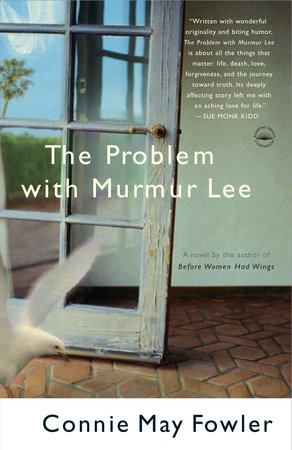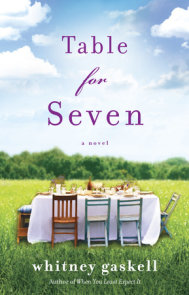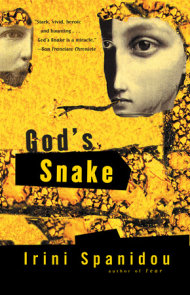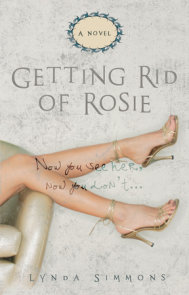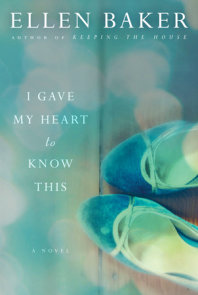READERS GUIDE
This introduction, discussion questions, and author bio that follow are intended to enhance your group’s discussion about Connie May Fowler’s The Problem With Murmur Lee. We hope that they will provide useful ways of thinking and talking about the novel.The bestselling author of Before Women Had Wings spins a wild new tale about the strong bonds among a group of friends that loses its quirkiest member. Exploring new literary territory while keeping to her native Floridian roots, Fowler is here at her most original and entertaining.
As a new year dawns over the island of Iris Haven, Murmur Lee Harp and her lover, Billy, go for a romantic sail without a care in the world. The evening comes to an abrupt halt when Murmur Lee discovers that she has drowned–but by whose hand?–in the Iris Haven river.
Grief-stricken and haunted by the mysteries surrounding her death, Murmur Lee’s circle of friends sets out to discover what really happened to her, and in the process they learn as much about her failings and triumphs as their own. After years of self-exile in the North, Charlee Mudd returns to set her best friend’s affairs in order, only to confront her own ghosts. Edith Piaf, a former marine whose sex change at the age of sixty-two Murmur Lee supported unquestioningly, must find the confidence to carry on without the encouragement of her friend. Lonely widower Dr. Zachary Klein plummets into the depths of depression at the loss of the second woman he has ever loved. As for Murmur Lee–who lived her entire life on an island named by her great-great grandfather in honor of the Greek goddess who receives the souls of dying women–in death she experiences her own journey as she is plunged into her familial past and discovers the truth about who she really is.
With poignancy and humor Fowler weaves the voices of Murmur and her friends into a compelling narrative. Part family saga, part murder mystery, The Problem with Murmur Lee is Fowler’s most rewarding and engrossing work yet.
Questions and Topics for Discussion
1. On the frontispiece is a quote from John Berger: “There is never a single approach to something remembered.” What does that mean, in terms of this novel? Why do you think Connie May Fowler chose that quote? Discuss Fowler’s use of multiple narrators and multiple perspectives, and especially Murmur Lee as narrator after death.
2. Aside from the first-person narration of the characters themselves, Fowler also intersperses written ephemera–diary entries, a shopping list, a note passed during childhood. What purpose do these scraps serve to the progression of the story, and our understanding of Murmur Lee?
3. Murmur Lee describes herself on page 9 as “the lover to many men, a good friend to a well-chosen few, a daughter who’d been secretly wild but openly obedient, a mother who’d never stopped viciously mourning the loss of her only child, a woman who despite some tough breaks and lapses in judgment had made her own way in the world.” Is this an accurate description? Compare it to the “lessons I’ve learned since dying,” on pages 162 and 163. How has Murmur Lee’s perspective on herself changed?
4. Birds appear over and over throughout the novel, from a swan feather on the first page to a seagull on the last. Why? What do the various bird images mean to you?
5. Murmur Lee is a witch, and her status is presented very matter-of-factly throughout the book. Why do you think she began to practice witchcraft? Did it have anything to do with her religious upbringing? Do you believe in the power of spells?
6. Discuss Murmur Lee’s experience with childhood religious visions. As she says on page 73: “How astounding to be the focus of my mother’s ecstatic passion, how bone-breaking delicious to be the object of her approval!” How much of Murmur Lee’s seizures do you attribute to medical causes, and how much to the desire to please her mother? What effect did they have on her as an adult, aside from the obvious one?
7. Charlee Mudd left the South behind, hoping to transform herself into a Northerner. Was she successful? In what ways did she fail? And what about the novel itself–would you consider it a “Southern” novel?
8. The circumstances of Murmur Lee’s death are questioned and discussed throughout the novel, and the truth is revealed only at the end. Does that make this a mystery? How does the novel fit into the conventions of classic mystery writing, and how does it break them?
9. According to Murmur Lee, her great-great-grandfather named their island Iris Haven after the Greek goddess of the rainbow, but without realizing that Iris also “had one hell of a job: She received the souls of dying women.” Murmur Lee asks, “Did his ignorant foray into the world of nomenclature curse this place? Is that why we keep dying out here, again and again, so young?” (pg 32) What do you think of Murmur Lee’s assessment of the situation? Is it possible for a name to curse a place like that?
10. Murmur Lee didn’t know that she was the product of a rape until after her own death. In what ways did it affect her while she was still living?
11. Compare and contrast Zachary’s behavior while Katrina was dying with Erik’s during Blossom’s illness. Do you see a parallel? Does Murmur Lee’s compassion for Zachary result from her own experience with Erik?
12. On page 120 Charlee wonders about Murmur Lee’s will: “Did she know her time was up? Had she made a decision–watery and vague, but a decision nonetheless–that she’d best set her affairs in order? How does a healthy thirty-five-year-old woman come by that sort of precognition?” How would you answer those questions? Does the existence of a relatively young woman’s will indicate a subconscious readiness to die?
13. After Murmur Lee has sex with Billy for the first time, she asks him if he loves his mother; he replies that he was happy when she died. Murmur Lee is tremendously upset by his response, recognizing an old pattern of hers. What is the significance of this? If Murmur Lee hadn’t died, do you believe she and Billy would have ended up together? Why, or why not?
14. Discuss the characters of Lucinda Smith, Edith Piaf, and Ariela van den Berg. What purpose(s) do they serve in the novel?
15. Why does Zachary punch Billy?
16. Throughout the novel there are countless references to ghosts, and wind. After death, in fact, Murmur Lee is surrounded by gusts and flows. What do you think this means? What do you think happens to us after death?
17. What does the title mean? What is the problem with Murmur Lee?









